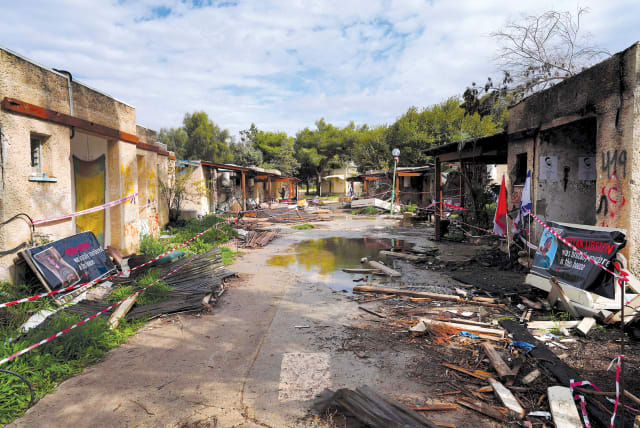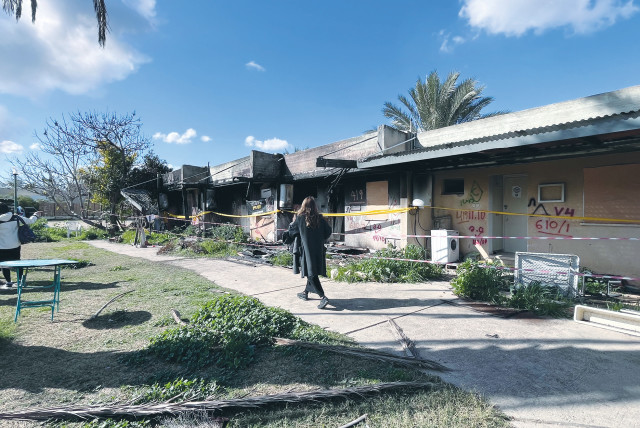Hamas massacre victims were feudal vassals, not 'privileged Israelis' - opinion

A fact largely unknown by the public, even in Israel, is that both the land and the housing are owned by the state, with property rights often worse than under feudal landlords.
Did you know that the lauded kibbutzim in Israel have no legal property or housing rights, almost like vassals under feudalism?
Many of the victims of the massacre by Hamas on October 7 were members of the communal villages (kibbutzim) located close to the Israel-Gaza border fence.
A fact largely unknown by the public, even in Israel, is that both the land and the housing are owned by the state, and property rights are in many ways worse than under feudal landlords.
How Israel's kibbutzim live under feudalism
You may have thought that the kibbutz, as a collective, owns the land, which would be managed according to the collective will of its members. This, too, is inaccurate. The kibbutz owns not a centimeter of land – not the housing or the agriculture or the industry. This means that when the family assets of the massacred are assessed, they are likely to be minimal. No real property value to bequeath to the surviving family members or to the kibbutz association. This is the situation after three generations of self-sacrifice of living in an initially remote area of pre-state Israel and under prolonged and extreme security threats that varied from period to period.
The absence of either collective or private real-property rights holds for all the kibbutzim across Israel – some of them with seven and eight generations of history since the founding members. Each and every kibbutz has periodically faced security threats during pre-state and state years. After the establishment of the state, some kibbutzim volunteered to set up in the most difficult climatic areas in the southern desert and along the Jordan Valley. Despite the physical hardships, the kibbutzim have been conducting globally exemplary farming productivity, creating innovative industries, services and technologies, and contributing to regional and national public good well beyond their 2% representation in the population.
Under the canopy of state land ownership, the Israel Lands Authority (ILA) also acts as a regulatory agency, over and above the regular state regulators (land-use planning, taxation). The ILA continues to invent a variety of rules that intervene with the day-to-day lives at both the kibbutz and individual levels. The facts of the onerous rules that the state imposes on the lives of these exemplary communities have never been part of public discourse. The idealistic nature of the kibbutz members, their perpetual sense of public service, alongside their no-complaints legacy, have allowed the state to retain the antiquated notion of state-owned land, long after the state gradually privatized urban housing over the years. State land ownership in the communal villages is one of the last vestiges of the centralist and quasi-socialist institutions that characterized Israel’s early years. These have been removed from almost every walk of life except the controls over the communal villages’ lives.
There is also an ugly side to the perseverance of the state land-ownership anomaly. Given the above facts, it’s hard to believe that kibbutzim and their members, everywhere in the country, have in recent decades become targets for political incitement under the myth that they are a “privileged rich elite” class.
With no real estate assets, the facts are, of course, the opposite. Apparently, it is easy to generate jealousy-driven disinformation against a minority. What the rest of the population see is the well-managed green villages with excellent self-supplied education and cultural services. Community cohesion has also succeeded over decades in producing housing that is modest but egalitarian.
No researchers before us have ever addressed the land policy imposed on the kibbutzim. Our socio-legal-empirical research seeks to lift the veil from the archaic and unjust state land policy which has become entrenched and blind to the outside world. With the use of a variety of theories and methods drawn from law, economics, sociology, and public policy, the Neaman Institute of National Policy Research at the Technion has launched groundbreaking research to reassess the axiom that the state should continue to own the land where the kibbutz members reside and work.■Rachelle Alterman is a Technion professor (emerita) of urban planning and law and a senior researcher at the Samuel Neaman Institute for National Policy Research. She is a member of the Israel National Academy of Sciences and founding president of the International Academic Association on Planning, Law, and Property Rights. The research team includes Dr. Micha Drori; Adv. Efrat Aviram Vas; Dr. Avi Shneider; and Dr. Guy Kagan. For further details or interest in participating in this project, contact: kibbutzim@sni.technion.ac.il
Jerusalem Post Store
`; document.getElementById("linkPremium").innerHTML = cont; var divWithLink = document.getElementById("premium-link"); if (divWithLink !== null && divWithLink !== 'undefined') { divWithLink.style.border = "solid 1px #cb0f3e"; divWithLink.style.textAlign = "center"; divWithLink.style.marginBottom = "15px"; divWithLink.style.marginTop = "15px"; divWithLink.style.width = "100%"; divWithLink.style.backgroundColor = "#122952"; divWithLink.style.color = "#ffffff"; divWithLink.style.lineHeight = "1.5"; } } (function (v, i) { });

